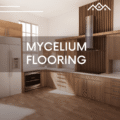Luxury vinyl plank (LVP) flooring is made of dense, multi-layered vinyl that’s mostly non-porous. In other words, the vinyl itself doesn’t soak up smells the way carpet or wood can. So in a strict sense, odor cannot pass through the solid vinyl plank. However, this doesn’t mean an LVP floor can’t smell. If spills, pet accidents, or moisture get into tiny gaps between planks or underneath the floor, those trapped messes can create bad odors. In practice, odors in an LVP floor usually come from what’s below or between the planks, not the vinyl material itself. The key takeaway: Luxury vinyl resists odors, but gaps and moisture can still trap smells if not cleaned promptly.
Why LVP Flooring Resists Odors
Luxury vinyl plank flooring has a special construction that makes it very odor-resistant. Each plank typically has a hard wear layer on top and a rigid core underneath. These layers seal out liquids and smells. Because LVP’s surface is smooth and sealed, things like water, pet urine, or spilled drinks cannot easily penetrate through the vinyl. Instead, these liquids bead up on the surface, allowing you to wipe them away quickly. In simple terms, an LVP floor is water-resistant and non-porous, so it won’t absorb odors like wood or carpet might. This is why vinyl floors are so popular in kitchens and bathrooms – they don’t trap stains or smells.
How Odors Can Get Trapped Under LVP
Stinky floors usually mean something gross got between the planks. Maybe you spilled your coffee and didn’t mop it up fast enough, or your dog decided the living room was his personal bathroom—either way, that mess can sneak through those tiny little spaces in the flooring. And if it sits there? Yikes. Mold and mildew start throwing a party, and suddenly your place smells like a forgotten gym bag. Even if you don’t spill anything, just having too much humidity can make the seams gap open, which lets even more moisture slide in. Oh, and if whoever installed your floor did a sloppy job—didn’t snap things together tight, skipped the moisture barrier—well, congrats, now water has even more secret places to hang out and cause a stink.
In short, odors don’t travel through the vinyl itself – they lurk in the nooks and crannies. Common sources include:
- Pet accidents or spills left on the floor too long.
- Gaps between planks from shifting boards or loose seams.
- Wet subfloor beneath the vinyl (from leaks or high humidity).
- Mold or mildew growth under the floorboards, creating a “musty” smell.
By understanding this, it’s clear that preventing odor means keeping moisture and dirt out of those hidden spots.
Preventing Odors in Vinyl Plank Floors
Keeping your vinyl floors smelling fresh is mostly about smart installation and routine care. Here are some proven tips:
- Ensure a tight installation. If you’re putting down LVP, either shell out for a pro or, if you’re the DIY type, actually read the manufacturer’s instructions instead of winging it. The planks gotta snap together—like, no weird gaps or wobbly edges. Oh, and don’t cheap out on the underlayment. Get a solid, moisture-resistant one (or a vapor barrier, whatever they call it). That little layer is what keeps soggy floors and mold nightmares away, trust me.
- Clean up spills immediately. Blot or wipe any spills (water, juice, pet messes) right when they happen. The faster you remove liquids, the less chance they have to seep into gaps and cause odor. Even though LVP is water-resistant, trapped dampness can still lead to smells if ignored.
- Use the right cleaners. Ditch the hardcore chemicals—seriously, they’ll just wreck that vinyl finish like sandpaper on your face. Grab a pH-neutral cleaner made for vinyl floors instead. Those mild, floor-friendly cleaners do the job without trashing the surface. Trust me, treating your floor gently now saves you a headache later.
- Regular sweeping and mopping. Dirt, hair, and crumbs can collect between planks over time and hold moisture. Sweep or vacuum often to remove debris, then mop weekly or as needed with a lightly damp mop. A clean floor surface means fewer places for odor-causing bacteria to hide.
- Control humidity and ventilation. Keep the air moving, seriously. Flip on those exhaust fans when you’re cooking or showering—nobody wants their house smelling like last night’s stir-fry or a gym locker. If you’ve got a basement or some weirdly damp corner, just toss a dehumidifier in there and let it work its magic. Trust me, decent airflow is your best shot at keeping mold and that gross musty funk from creeping in under the floors.
- Use rugs and mats. Placing washable mats in high-risk spots (under pet bowls, near sinks) can catch spills before they spread. Remember to clean the mats too!
By following these steps, you’ll minimize the chance of odor getting a foothold. Proper maintenance makes sure that how to prevent odor from penetrating your LVP floor is never a big problem.
Cleaning Vinyl Plank Floors to Keep Odors Away

A solid cleaning routine is key to fresh-smelling floors. Here’s a simple, effective process:
- Daily dusting: Start by sweeping or vacuuming once a day or every other day. This picks up dirt and crumbs before they settle into seams. Use a soft broom or vinyl-friendly vacuum setting to avoid scratches.
- Spot-clean immediately: Jump on spills right away—don’t just stand there staring at the mess. Grab a clean rag, blot up whatever disaster just landed on your floor, and then hit it with some warm water or a mild vinyl cleaner. If your furry friend left you a special surprise, enzyme cleaners work magic for killing that stink.
- Regular mopping: As for mopping, once a week (or, let’s be real, whenever it starts looking grimy), go over the floor with a pH-neutral cleaner. But don’t go all Poseidon on it—wring out your mop so it’s barely damp. Too much water just ends up sneaking under the vinyl, and trust me, that’s a headache you don’t want.
- Deodorizing treatment: If a mild smell lingers, sprinkle baking soda over the area and let it sit for a few hours, then vacuum it up. Baking soda is a natural odor absorber. You can also use activated charcoal pouches in the room to help neutralize stale smells.
- Deep cleaning: Monthly, give your floors a deeper clean. Use a cleaner designed for vinyl floors and follow instructions. Skip abrasive scrubbers that might wear off the protective layer.
Consistency is the secret – a clean vinyl floor stays fresher. As the experts say, “sweep or vacuum your floors often” and mop lightly. This keeps any spills from turning into long-term smells.
When Odor Persists: Extra Steps
If you’ve cleaned thoroughly and still notice a bad smell, it may mean odor is trapped underneath. In this case:
- Check the subfloor. Odors are often hiding below the vinyl. If you can, lift a plank in an inconspicuous spot and sniff underneath. If the subfloor or underlayment smells musty, you might have mold or trapped moisture. It may be necessary to call a professional to inspect and fix any leaks or mold growth.
- Toss some baking soda or a chunk of charcoal in there and just let ’em chill overnight—seriously, those things are like little stink vacuums. Next day, just vacuum up the mess and, boom, it’s already way less funky.
- Crack a window, flip on a fan—whatever gets the air moving, do it. Sure, it’s not gonna magically fix a sneaky leak or anything, but it’ll definitely help kick out those stubborn smells that just won’t quit.
Even if it means lifting up a few planks, addressing the source is important. Often the vinyl itself just needs a good clean; the real culprit was moisture below all along.
FAQs
Can luxury vinyl flooring ever trap pet or urine odors?
Vinyl plank itself repels moisture, but pet messes can hide in the seams if not cleaned quickly. Always blot and clean pet accidents immediately, then use an enzyme cleaner to neutralize any urine smells. This prevents bacteria or mold from building up under the planks.
Are luxury vinyl floors waterproof?
Loads of luxury vinyl planks (yeah, especially the ones with those beefy solid cores, like SPC or WPC) can totally handle water—like, you can spill your drink and the planks won’t freak out or turn into a soggy mess. Thing is, “waterproof” isn’t some magic force field. If you let water sit around forever, or if it sneaks under a loose edge or a dodgy cut, it’ll still find a way to mess with your subfloor. So, yeah, wipe up those spills unless you’re into surprise renovations.
Why does my new vinyl floor have a plastic smell?
New vinyl floors sometimes have an initial “newness” odor from packaging or slight off-gassing of materials. This smell is normal and usually fades within a few days with ventilation. It’s different from the musty smell caused by moisture – just air out the room and it should go away.
Is it okay to use vinegar or bleach to clean vinyl floors?
It’s best to avoid bleach or vinegar at full strength. These can dull or damage the vinyl over time. Instead, use a mild, pH-neutral cleaner made for vinyl flooring. A simple homemade cleaner is 1 cup vinegar mixed into 1 gallon of water (vinegar diluted 1:10) for gentle cleaning without residue.
How do I get rid of a musty odor on vinyl plank floors?
Start with a legit scrub-down using a cleaner that won’t wreck your vinyl. Get in there—no half-hearted wiping. Once that’s done and the floor’s dry, dump a bunch of baking soda everywhere. Don’t be stingy. Leave it for a few hours, maybe go binge a show or run errands, then vacuum it up like you’re hunting for treasure. Still smells funky? Ugh. Time to get a little destructive: pop off the baseboards or carefully pry up a plank. Check the subfloor—if it’s gnarly or moldy, hit it with some hardcore cleaner. Oh, and seriously, make sure everything is bone dry and air it out like crazy. Musty vibes hate fresh air.
Can I just replace the smelly planks?
Yeah, you can yank out the offending vinyl pieces if they’re gross or reeky, but here’s the kicker: Usually the real problem’s lurking underneath. You rip out a plank, slap in a new one, and—boom—smell’s still there, laughing at you. So if you’re gonna bother, actually check the underlayment. Sometimes that junk needs a deep clean, or honestly, just toss it and get fresh stuff. And please, let it all dry out before you seal it up or you’ll just be trapping a swamp under your fancy new floor.
Look, vinyl’s pretty forgiving—it wants to be your low-maintenance buddy. Just don’t be lazy: mop up spills, fix leaks, and air things out now and then. Your nose (and probably your guests) will thank you.



